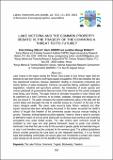| dc.contributor.author | OGELLO Erick Ochieng, OBIERO Kevin, MUNGUTI Jonathan Mbonge | |
| dc.date.accessioned | 2020-08-24T08:03:02Z | |
| dc.date.available | 2020-08-24T08:03:02Z | |
| dc.date.issued | 2013-12-15 | |
| dc.identifier.citation | 17 | en_US |
| dc.identifier.issn | 1844-6477 (print version) | |
| dc.identifier.issn | 2284-5305 (electronic version) | |
| dc.identifier.uri | https://repository.maseno.ac.ke/handle/123456789/2283 | |
| dc.description.abstract | Lake Victoria is the largest among the African Great Lakes in East African region that are believed to have both dynamic and fragile aquatic ecosystems. Within two decades, the lake has experienced extensive resource exploitation leading to constrained productivity and drastic decline of native biodiversity. Intensive non-selective fishing, catchment vegetation degradation, industrial and agricultural pollution, the introduction of exotic species and uneven patchwork of governmental laws are some of the reasons for the current ecological woes facing Lake Victoria. This paper intends to stimulate recognition of Lake Victoria and its catchment as a lived Commons, to be shared, protected, managed and enjoyed by all who live around it. The paper compares the original biodiversity status of the lake with the current status and discusses the role of unlimited access as a function of the loss of the Lake’s biological wealth. The Lake’s water resource base, fishery, wetlands and other aquatic resources have been exhaustively discussed. In this review, we uphold the Hardin’s school of thought that freedom of the commoners causes resource overuse leading to poverty. Therefore, limiting freedom could be essential. However, there is need for provision of alternative means of survival since people with no choices would continue over-exploiting ecosystems even under limited access. The Lake Victoria basin commons should be protected by strict legal and clear political framework based on public trust doctrine, reinforced in law that the Lake is vital for the survival of people, plants and animals living on or near it and therefore must be protected for the common good. The political jurisdictions should consider governing the Lake basin as one integrated watershed. It is our fervent hope that bordering communities will secure grass root movements to protect and nurture Lake Victoria and its environs for the benefit of the present and future generations. | en_US |
| dc.publisher | Romanian Limnogeographical Association | en_US |
| dc.subject | The Lake Victoria, Commons, Tragedy, Biodiversity, Freedom | en_US |
| dc.title | Lake Victoria and the common property debate: Is the tragedy of the commons a threat to its future? | en_US |
| dc.type | Article | en_US |

